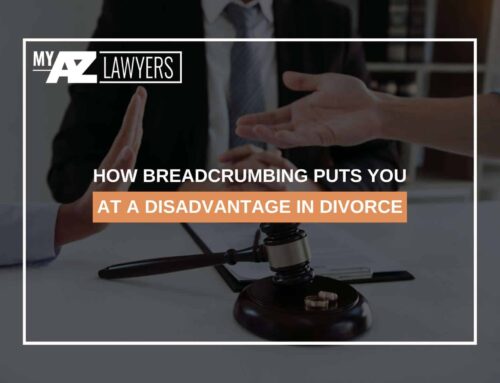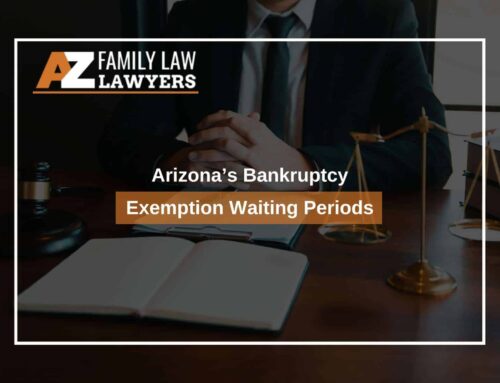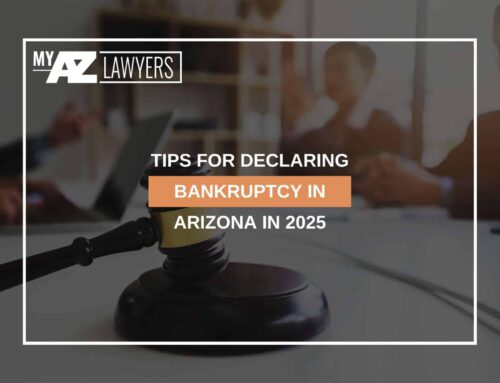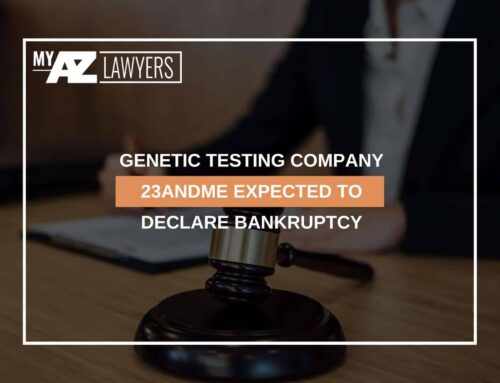Table Of Contents
- Filing Chapter 7 Bankruptcy Without Your Spouse
- Filing Chapter 13 Bankruptcy Without Your Spouse
- What Happens To Community Property Debt In An Individual Bankruptcy?
- How Can I Protect Myself If My Spouse Files Bankruptcy Without Me?
- Frequently Asked Questions
- Contact An Experienced Bankruptcy Attorney In Arizona
Can I File Bankruptcy In Arizona Without My Spouse?
When you take your wedding vows, you’re agreeing to take part in almost every part of your spouse’s life. Arizona is also a community property state, which means that all debts and assets acquired during the marriage belong equally to both spouses. So it seems like with everything that spouses are expected to share, filing bankruptcy would be among them. However, contrary to what many people assume, you do NOT have to file bankruptcy with your spouse. Our Arizona bankruptcy team is here to discuss when it may be advantageous to file bankruptcy without your spouse, and how to proceed. If you have any more questions about filing bankruptcy sans spouse, call our firm at 480-470-1504 for your free consultation.
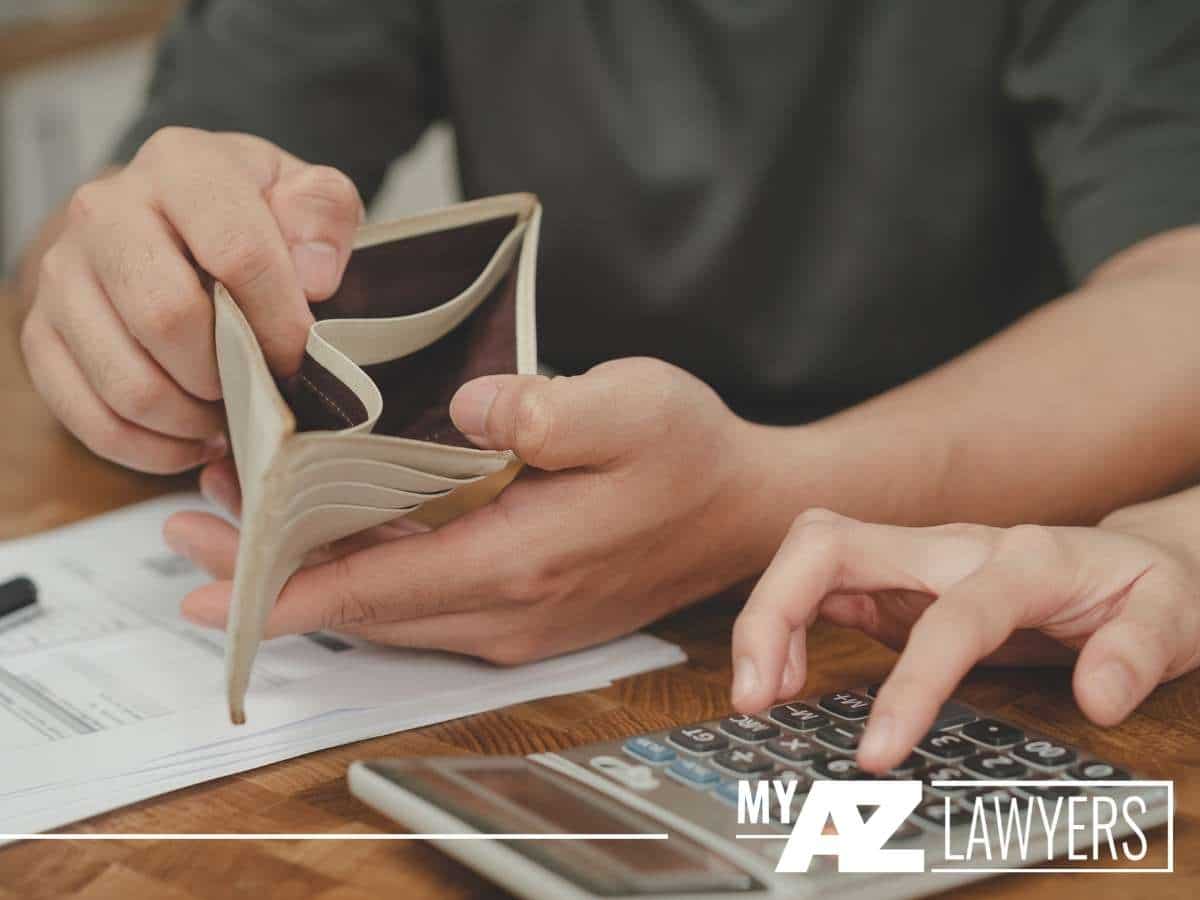
Filing Chapter 7 Bankruptcy Without Your Spouse
Filing Chapter 7 bankruptcy without your spouse is much simpler than filing Chapter 13 bankruptcy without your spouse. That is, in part, because it doesn’t last as long from start to finish. A Chapter 7 bankruptcy will typically be discharged within three to six months. It wipes away unsecured, non-priority debts like credit cards, medical bills, and personal loans. So when might it make sense to file Chapter 7 bankruptcy without your spouse? Let’s say that before you got married, you had $5,000 in a credit card which has ballooned out of control due to interest. That debt is your separate property, and any debts incurred after the wedding are community property debt. If the majority of your debts are separate property and unsecured, an individual Chapter 7 bankruptcy lawyer could help you clear that debt without negative repercussions for your spouse.
One of the issues with filing Chapter 7 bankruptcy as an individual when you are married is that your spouse’s income and belongings will still be included in your bankruptcy calculations. To qualify for Chapter 7 bankruptcy, your household income must be less than Arizona’s state median income, or you must pass the Means Test. When you file an individual bankruptcy as a married person, your household income still includes your spouse’s. Your income will be combined and averaged over the previous 6 months before you file. Qualifying for Chapter 7 bankruptcy can be tricky in these types of situations, especially in a dual earner household.
Another issue when you file Chapter 7 bankruptcy with your spouse is that their property might not be protected by bankruptcy exemptions. Many of Arizona’s bankruptcy exemptions, including the $250,000 homestead exemption, don’t increase just because the debtor is married. Other Arizona bankruptcy exemptions only increase moderately when the debtor is married. For example, in Arizona, the motor vehicle exemption is $15,000. This type of exemption can be doubled and applied to two vehicles for married couples. If you and your spouse have disproportionate separate property debts, it’s highly likely that your spouse has some possessions that wouldn’t be protected by Arizona’s bankruptcy exemptions.
Filing Chapter 13 Bankruptcy Without Your Spouse
Filing Chapter 13 bankruptcy without your spouse is much more complicated than filing Chapter 7 without your spouse. There are several reasons for this. One is because your payment plan will last either three or five years, depending on how your household income compares to the state median. This is a long time for your financial situation to be frozen by the automatic stay. Another fact of the matter is that three to five years is enough time for a couple to fall out of love and decide to get a divorce, which will be almost impossible to complete during a Chapter 13 bankruptcy.
When you file Chapter 13 bankruptcy, your debts are reorganized into a payment plan that is based on your disposable monthly income. This is another reason that filing Chapter 13 without your spouse can be complicated. Even if you file as an individual, your payment plan will be formulated using your disposable monthly household income. It is unlikely that your spouse wants all of their spare income going towards your Chapter 13 payment plan without being included. You and your spouse may need to work out another way to deal with your debts if Chapter 7 bankruptcy isn’t an option. You can discuss alternatives for free with our Arizona bankruptcy team. Give our chapter 13 bankruptcy lawyers a call, 480-470-1504, and let us know when is most convenient for your free consultation.
What Happens To Community Property Debt In An Individual Bankruptcy?
Even if the reason you want to file bankruptcy is because of insurmountable separate property unsecured debts, you may still have community property debts that can’t be excluded from your bankruptcy. For example, filing Chapter 7 bankruptcy won’t erase the mortgage on your community property home. The balance for smaller secured community property debts, like cars, can be paid off in a Chapter 13 bankruptcy payment plan. But it can be more complicated if you discharge unsecured community property debts in an individual Chapter 7 bankruptcy.
If you file bankruptcy individually, community property debts will only be discharged in your name. If your spouse declines to join you in the bankruptcy filing, their separate property debts will not be discharged, and community property debts won’t be discharged in their name. Because of the protections provided by the automatic stay, the creditors for community property debts may not pursue you or your spouse during your bankruptcy. However, the automatic stay will end when your case is discharged or dismissed, or even sooner under special circumstances. If you ever divorce in Phoenix, your community property creditors are likely to pursue your spouse for the debts discharged in your bankruptcy. Therefore, declaring bankruptcy in AZ can help you further understand how your individual bankruptcy will impact community debts.
How Can I Protect Myself If My Spouse Files Bankruptcy Without Me?
Even if you don’t join your spouse in their bankruptcy filing, it’s best that you pick up at least some basic bankruptcy knowledge. Filing bankruptcy will likely take up much of your spouse’s time and attention for at least a few months. You simply won’t be able to talk to your spouse about their bankruptcy if you don’t learn some bankruptcy basics. If you want to be extra supportive, you may want to attend consultations and other meetings with your spouse’s bankruptcy attorney, or help them gather the documents necessary to draft their bankruptcy petition. Your spouse may also want your emotional support at their bankruptcy hearing, also known as a 341 Meeting of Creditors.
You should also understand bankruptcy so that you can comprehend what will happen to any debts you may have when your spouse files bankruptcy. You may see no impact at all, or even some slight protections. However, it’s important to still understand the long term effects, i.e., if you get divorced in AZ. You also need to understand the nuances if you are a cosigner on loans that your spouse discharges in their bankruptcy. Therefore, your spouse’s bankruptcy attorney should be able to walk you through all of these issues.
Frequently Asked Questions
Do we both need to complete the credit counseling and debtor education courses?
If you file a joint bankruptcy petition with your spouse, both of you need to be present for both courses. If one of you files an individual bankruptcy petition, only that spouse needs to complete the courses.
Does it cost less to file for bankruptcy without my spouse?
The filing fee for a joint bankruptcy is the same as for an individual filing, so filing without your spouse won’t save you any money as opposed to a joint filing. Keep in mind that if one spouse files individually and the other spouse ends up needing to declare bankruptcy later on, they will have to pay a separate filing fee and double your overall bankruptcy expenses.
What if my spouse is a co-signer on one of my loans?
A co-signer, even a spouse, can remain liable for a loan if the debtor clears it in bankruptcy. It is not cleared for the co-signer unless the co-signer files a joint bankruptcy with you. However, this won’t be an issue if you keep the loan in your bankruptcy- a common example is an auto loan for a car you wish to keep in bankruptcy. If you surrender the vehicle and its debt in bankruptcy, then your co-signer could be pursued for the remaining balance.
Does my spouse have to know if I file for bankruptcy without them?
There is no legal requirement to tell your spouse that you are filing for bankruptcy, although it can come with negative repercussions. It could seriously damage your relationship if your spouse finds out that you filed for bankruptcy without informing them. It could also materially alter agreements or estate planning documents you have created with your spouse in mind.
Who will know if my spouse files for bankruptcy?
Your spouse’s creditors all must be informed if they file for bankruptcy, but your landlord can be left off the list if the lease is going to be retained. Your spouse doesn’t get to hand-pick which debts are included in bankruptcy, so if they owe personal loans to friends and family members, they will need to be notified. Loan co-signers need to be notified of a bankruptcy filing as well. No one else needs to know if your spouse files for bankruptcy, although they will be able to search for it on the internet. If your spouse files without you, your name should not appear in any searches on the bankruptcy docket.
Should I file for chapter 7 or chapter 13 without my spouse?
It is generally much simpler to file a chapter 7 bankruptcy without your spouse than a chapter 13 bankruptcy. Bankruptcy can make it difficult for the rest of your household to engage in financial endeavors, so one advantage of chapter 7 bankruptcy is the shorter lifespan. It typically only lasts 3 to 6 months, while chapter 13 bankruptcy lasts 3 or 5 years. Additionally, a chapter 13 payment plan factors in all of your household income, not just your own. Your spouse probably won’t want to agree to all or almost all of your household income being paid into the payment plan without discharging their debts along with yours. But every situation is unique, so you should always review with an experienced bankruptcy attorney before deciding which chapter to file as a married individual.
Can my spouse still help me pay for my bankruptcy expenses?
Yes. Your spouse can pay your attorney’s fees, filing fees, and course fees if you are unable to make these payments yourself. You should apply for a fee waiver or to pay your fees in installments if you cannot afford your bankruptcy expenses, even with your spouse’s help.
Will my spouse be protected by the automatic stay during my individual bankruptcy case?
Any joint assets you have with your spouse will be under the automatic stay’s protection during your bankruptcy case. Because of Arizona’s community property laws, this is almost all assets acquired during the marriage. But if your spouse has separate property, such as a vehicle acquired before the marriage, this could still be susceptible to creditors during your bankruptcy. If your spouse is relying on this protection, make sure to communicate how long your case might last and if there are any issues in your case that could cause a dismissal.
How long will a bankruptcy stay on my spouse’s credit report?
If your spouse files for bankruptcy as an individual, it should not appear on your personal credit report. However, your spouse’s credit could be relevant for future financial applications you submit as a couple. If your spouse files for chapter 13 bankruptcy, it will remain on their credit report for 7 years. A chapter 7 bankruptcy will remain on their credit report for 10 years. Your spouse should be able to open up new lines of credit before that point, and is only disqualified from most home mortgages for 2 years after filing.
What are the filing fees for bankruptcy?
You should be aware of how much filing for bankruptcy costs if your spouse is filing a petition as an individual. A chapter 7 bankruptcy filing fee is $338, and the filing fee for a chapter 13 case is $313.
Should I retain a bankruptcy attorney to represent me in my individual filing?
You always have the choice to represent yourself in bankruptcy, which can save money. But there could be issues in your case that require specialized legal experience to resolve. This is even more likely to be the case if you are filing for bankruptcy as an individual despite being married. Your bankruptcy attorney can iron out problems that you might not be aware of and could cause disruptions at any point throughout your case. They can also provide a thorough review to confirm whether or not your spouse should be included in the filing. We recommend starting your bankruptcy journey with at least a consultation with an experienced bankruptcy attorney, so you can enter your case with confidence and knowledge about bankruptcy procedures. We even offer consultations free of charge so you don’t have to come out of pocket while making your decision- call 480-470-1504 for your free consultation today.
Contact An Experienced Bankruptcy Attorney In Arizona
If you or your spouse is looking for a bankruptcy attorney with experience in specialized issues like filing without a spouse, our Arizona law office has what you need. Plus, our dedicated Phoenix Bankruptcy Lawyers and Tucson bankruptcy staff and attorneys will work tirelessly to file your bankruptcy with as few drawbacks for you as possible. We will keep you apprised each step of the way, so that you and your spouse can feel confident in whatever decision you make regarding your bankruptcy. To get started with our low-cost bankruptcy attorneys, call 480-470-1504 or use our online form to request your free consultation today
Arizona Offices:
Mesa Location:
1731 West Baseline Rd., Suite #100
Mesa, AZ 85202
Office: (480) 448-9800
Email: info@myazlawyers.com
Website: https://myazlawyers.com/
Phoenix Location:
343 West Roosevelt, Suite #100
Phoenix, AZ 85003
Office: (602) 609-7000
Glendale Location:
20325 N 51st Avenue Suite #134, Building 5
Glendale, AZ 85308
Office: (602) 509-0955
Tucson Location:
2 East Congress St., Suite #900-6A
Tucson, AZ 85701
Office: (520) 441-1450
Avondale Location:
12725 W. Indian School Rd., Ste E, #101
Avondale, AZ 85392
Office: (623) 469-6603


